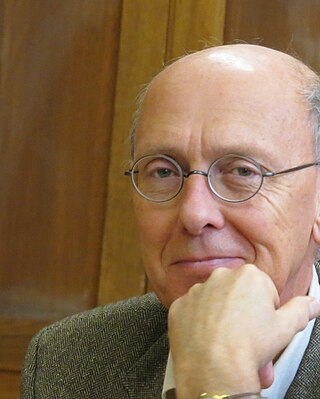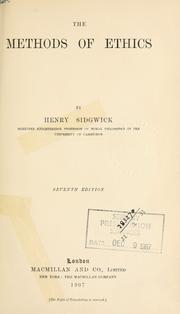Related Research Articles
Applied ethics refers to the practical aspect of moral considerations. It is ethics with respect to real-world actions and their moral considerations in the areas of private and public life, the professions, health, technology, law, and leadership. For example, the bioethics community is concerned with identifying the correct approach to moral issues in the life sciences, such as euthanasia, the allocation of scarce health resources, or the use of human embryos in research. Environmental ethics is concerned with ecological issues such as the responsibility of government and corporations to clean up pollution. Business ethics includes questions regarding the duties or duty of 'whistleblowers' to the general public or their loyalty to their employers.

In ethical philosophy, consequentialism is a class of normative, teleological ethical theories that holds that the consequences of one's conduct are the ultimate basis for judgment about the rightness or wrongness of that conduct. Thus, from a consequentialist standpoint, a morally right act is one that will produce a good outcome. Consequentialism, along with eudaimonism, falls under the broader category of teleological ethics, a group of views which claim that the moral value of any act consists in its tendency to produce things of intrinsic value. Consequentialists hold in general that an act is right if and only if the act will produce, will probably produce, or is intended to produce, a greater balance of good over evil than any available alternative. Different consequentialist theories differ in how they define moral goods, with chief candidates including pleasure, the absence of pain, the satisfaction of one's preferences, and broader notions of the "general good".
In ethical philosophy, ethical egoism is the normative position that moral agents ought to act in their own self-interest. It differs from psychological egoism, which claims that people can only act in their self-interest. Ethical egoism also differs from rational egoism, which holds that it is rational to act in one's self-interest. Ethical egoism holds, therefore, that actions whose consequences will benefit the doer are ethical.

Ethics or moral philosophy is a branch of philosophy that "involves systematizing, defending, and recommending concepts of right and wrong behavior". The field of ethics, along with aesthetics, concerns matters of value; these fields comprise the branch of philosophy called axiology.
In metaphilosophy and ethics, metaethics is the study of the nature, scope, and meaning of moral judgment. It is one of the three branches of ethics generally studied by philosophers, the others being normative ethics and applied ethics.
Normative ethics is the study of ethical behaviour and is the branch of philosophical ethics that investigates the questions that arise regarding how one ought to act, in a moral sense.
In ethical philosophy, utilitarianism is a family of normative ethical theories that prescribe actions that maximize happiness and well-being for all affected individuals.
Moral relativism or ethical relativism is used to describe several philosophical positions concerned with the differences in moral judgments across different peoples and cultures. An advocate of such ideas is often referred to as a relativist for short.
Reflective equilibrium is a state of balance or coherence among a set of beliefs arrived at by a process of deliberative mutual adjustment among general principles and particular judgements. Although he did not use the term, philosopher Nelson Goodman introduced the method of reflective equilibrium as an approach to justifying the principles of inductive logic. The term reflective equilibrium was coined by John Rawls and popularized in his A Theory of Justice as a method for arriving at the content of the principles of justice.

Groundwork of the Metaphysics of Morals is the first of Immanuel Kant's mature works on moral philosophy and remains one of the most influential in the field. Kant conceives his investigation as a work of foundational ethics—one that clears the ground for future research by explaining the core concepts and principles of moral theory, and showing that they are normative for rational agents.
In moral philosophy, deontological ethics or deontology is the normative ethical theory that the morality of an action should be based on whether that action itself is right or wrong under a series of rules and principles, rather than based on the consequences of the action. It is sometimes described as duty-, obligation-, or rule-based ethics. Deontological ethics is commonly contrasted to consequentialism, virtue ethics, and pragmatic ethics. In this terminology, action is more important than the consequences.

Applied philosophy is a branch of philosophy that studies philosophical problems of practical concern. The topic covers a broad spectrum of issues in environment, medicine, science, engineering, policy, law, politics, economics and education. The term was popularised in 1982 by the founding of the Society for Applied Philosophy by Brenda Almond, and its subsequent journal publication Journal of Applied Philosophy edited by Elizabeth Brake. Methods of applied philosophy are similar to other philosophical methods including questioning, dialectic, critical discussion, rational argument, systematic presentation, thought experiments and logical argumentation.

Charles Leslie Stevenson was an American analytic philosopher best known for his work in ethics and aesthetics.
Ethical intuitionism is a view or family of views in moral epistemology. It is foundationalism applied to moral knowledge, the thesis that some moral truths can be known non-inferentially. Such an epistemological view is by definition committed to the existence of knowledge of moral truths; therefore, ethical intuitionism implies cognitivism.

Kantian ethics refers to a deontological ethical theory developed by German philosopher Immanuel Kant that is based on the notion that: "It is impossible to think of anything at all in the world, or indeed even beyond it, that could be considered good without limitation except a good will." The theory was developed in the context of Enlightenment rationalism. It states that an action can only be moral if (i) it is motivated by a sense of duty and (ii) its maxim may be rationally willed a universal, objective law.

Jonathan Peter Dancy is a British philosopher, who has written on ethics and epistemology. He is currently Professor of Philosophy at University of Texas at Austin and Research Professor at the University of Reading. He taught previously for many years at the University of Keele.
Two-level utilitarianism is a utilitarian theory of ethics developed by R. M. Hare. According to the theory, a person's moral decisions should be based on a set of moral rules, except in certain rare situations where it is more appropriate to engage in a 'critical' level of moral reasoning.
Moral rationalism, also called ethical rationalism, is a view in meta-ethics according to which moral principles are knowable a priori, by reason alone. Some prominent figures in the history of philosophy who have defended moral rationalism are Plato and Immanuel Kant. Perhaps the most prominent figure in the history of philosophy who has rejected moral rationalism is David Hume. Recent philosophers who have defended moral rationalism include Richard Hare, Christine Korsgaard, Alan Gewirth, and Michael Smith.
In philosophy, a thick concept is a kind of concept that both has a significant degree of descriptive content and is evaluatively loaded. Paradigmatic examples are various virtues and vices such as courage, cruelty, truthfulness and kindness. Courage for example, may be given a rough characterization in descriptive terms as '...opposing danger to promote a valued end'. At the same time, characterizing someone as courageous typically involves expressing a pro-attitude, or a good-making quality – i.e. an evaluative statement.

The Methods of Ethics is a book on ethics first published in 1874 by the English philosopher Henry Sidgwick. The Stanford Encyclopedia of Philosophy indicates that The Methods of Ethics "in many ways marked the culmination of the classical utilitarian tradition." Noted moral and political philosopher John Rawls, writing in the Forward to the Hackett reprint of the 7th edition, says Methods of Ethics "is the clearest and most accessible formulation of ... 'the classical utilitarian doctrine'". Contemporary utilitarian philosopher Peter Singer has said that the Methods "is simply the best book on ethics ever written."
References
- ↑ "Moral Particularism". Internet Encyclopedia Of Philosophy. Retrieved 17 October 2019.
- ↑ "Moral Particularism | Internet Encyclopedia of Philosophy" . Retrieved 13 August 2021.
- ↑ "Moral Particularism and the Role of Imaginary Cases". European Journal of Pragmatism and American Philosophy. Retrieved 17 October 2019.
- ↑ Mele, Alfred R.; Rawling, Piers, eds. (5 February 2004). The Oxford Handbook of Rationality (1 ed.). Oxford University Press. doi:10.1093/0195145399.001.0001. ISBN 978-0-19-514539-7.
- ↑ Dancy, Jonathan (2017), "Moral Particularism", in Zalta, Edward N. (ed.), The Stanford Encyclopedia of Philosophy (Winter 2017 ed.), Metaphysics Research Lab, Stanford University, retrieved 4 December 2022
- ↑ McDowell, John; The Hegeler Institute (1979). Sugden, Sherwood J. B. (ed.). "Virtue and Reason". Monist (in German). 62 (3): 331–350. doi:10.5840/monist197962319. ISSN 0026-9662.